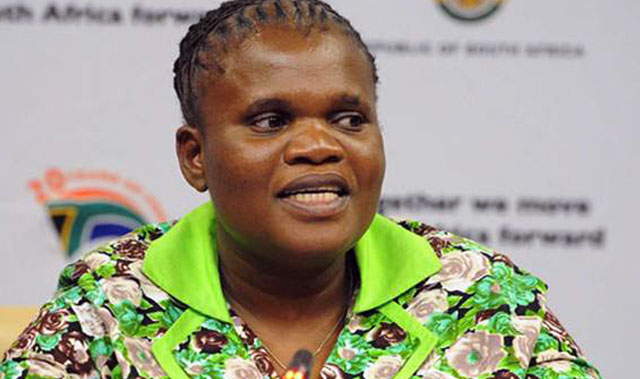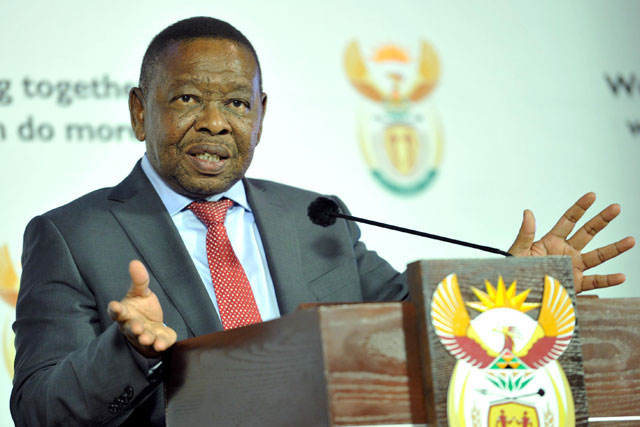
Communications minister Faith Muthambi has lashed out at her cabinet colleague Blade Nzimande after the higher education minister and South African Communist Party leader said that she had gone against the ANC and alliance decisions on digital terrestrial television migration.
In an interview with Eyewitness News last week, Nzimande hinted that lobbying by Naspers and subsidiary MultiChoice, which owns DStv, could have been behind the minister’s decision.
“We know that Naspers and MultiChoice have been lobbying very hard, but I’m not saying it’s as a result of that lobbying that he has done that, but we know that they have been lobbying very, very hard in order to keep their monopoly. That’s why monopolies are dangerous,” Nzimande told Eyewitness News.
In May, e.tv won a high-stakes legal battle at the supreme court of appeal. The court found that an amendment in 2015 by Muthambi to South Africa’s digital migration policy did not follow a process of consultation and was irrational and in breach of the principle of legality.
The court found, too, that the amendment did not achieve its purpose and was thus irrational and invalid. Muthambi purported to bind regulatory authorities and broadcasters and thus acted ultra vires, the court said.
To either expressly or by implication allege that minister Muthambi has gone against the ANC policy on digital migration amendments is patently untrue
The judgment was particularly critical of Muthambi’s failure to consult with communications regulator Icasa and the universal access agency Usaasa over the amendment.
“It’s very unfortunate that it’s the [supreme court of appeal] that must reinstate what was originally the position of the ANC,” Nzimande told EWN.
But Muthambi has hit back at Nzimande.
“To either expressly or by implication allege that minister Muthambi has gone against the ANC policy on digital migration amendments is patently untrue,” her office said in a statement.
“Furthermore it is disingenuous and a veiled attack on the integrity of minister Muthambi to seek to suggest that the minister may have been successfully lobbied by any group of interested parties,” the statement said.
“The truth of the matter is that the minister of communications has been defending a broadcasting digital migration policy and amendments which were approved by the cabinet.”
In its statement, the ministry referred to the statement of the cabinet meeting of 4 March 2015, which said: “Cabinet approved the broadcasting digital migration amendment policy with the inclusion of the control system in the set-top box, which will be clearly defined when the policy is published.”
The ministry said government’s position is that there should be a control system to prevent the sale of government-subsidised set-top boxes from being sold outside the borders of South Africa. Such a system has been put in place, it said.

“It is not the position of government to subsidise commercial players, by putting in place encryption for conditional access, which is a pay-TV technology. Government … has been very clear that if parties want to do this then it is at their own cost.”
The statement continued: “It is unfortunate that the two types of encryption have been conveniently confused and conflated to undermine the cabinet position and isolate minister Muthambi.”
On the supreme court of appeal judgment in e.tv’s favour, the ministry said: “Contrary to popular belief that the whole policy has been struck down by the supreme court of appeal, [the court] has only repealed a single clause in the policy…”
This clause states that the set-top box control system for subsidised free-to-air digital set-top boxes will not have the capability of encrypting or decrypting broadcasting signals, the statement said.
As a result, the court has “left the core principles of government policy in place”.
“Furthermore, the judgment did not order the halting of the roll-out of set-top boxes and thus the work of government will continue undeterred,” the statement said.
“Encryption is not required for free-to-air broadcasting or free-to-air digital set-top boxes; [encryption] is a pay-TV technology. Free-to-air broadcasters globally broadcast high-definition content without encrypting the broadcast signal.
It is not clear why minister Nzimande has singled out MultiChoice’s lobbying on this issue
“The only requirement by rights holders is that the set-top box make provision to prevent the copying of HD content. The compulsory standard for free-to-air digital terrestrial television set-top boxes, Sans 862, provides for high-bandwidth digital content protection (HDCP) to satisfy this requirement of high-definition content rights holders.
“The broadcasting digital migration policy has never been a secret document; it has always been available as a public document until it was finally approved by cabinet on 4 March 2015.
“It is not clear why minister Nzimande has singled out MultiChoice’s lobbying on this issue, as e.tv has also been lobbying just as hard, as have manufacturers and other entities in civil society,” the ministry’s statement said.
“In making a policy decision, the minister considers all submissions that are made, and then, in concurrence with cabinet, determines what is in the public interest. It is quite unfortunate that expedient agendas undermine not only the intentions of the judiciary but also those of cabinet.” — (c) 2016 NewsCentral Media




